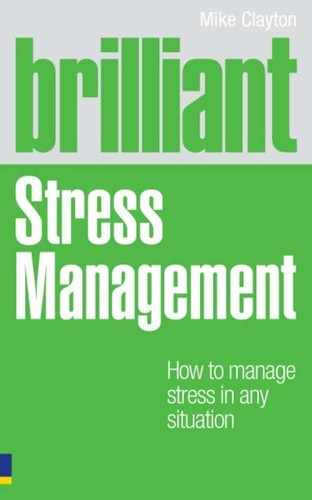122 brilliant stress management
will usually nd the solution rst; the one who is most exible
in their behaviour will get what they want; and the one who is
most exible in their response to change will feel that they are
in control. Flexibility is about creating choices and is what stops
determination becoming obsession. To be exible, you need to
be able to step back from a challenge, see it objectively, and
then nd a wide range of options. The process to SCOPE a
problem that you read in Chapter 5 will help you to step back,
but sometimes you need more resources. Give yourself time,
refresh yourself with a walk in the open air, consult friends or
colleagues, or pick up some random books or magazines for
stimulus.
Persistence
‘If at rst you don’t succeed, try something else.’
We saw this in Chapter 3, but the key here is to keep trying.
Once again, know the boundary between determination and
obsession, but also know that failure is rarely inevitable.
Gratitude
Prayer has been a part of human life and public ritual for as
long as recorded history. Only now are we nding out why it is
so powerful in bringing about change and a sense of wellbeing.
And it need not have anything to do with religion: if you have a
faith, you can believe what you choose about how prayer works,
and if you have none at all, you can reect on what modern
science is learning.
Maximisers and satisficers
The psychology of decision-making divides us neatly into two
groups, the maximisers and the satiscers. Which are you?
If you are a maximiser, you usually want the best
product, solution or deal. You will examine every option
Control your mental response to stress 123
very carefully and will agonise over details. Missing
information can lead you to get stuck and not feel able to
decide.
If you are a satiscer, then you know what you want and
will happily decide on the rst product, solution or deal
that meets your needs. ‘Good enough’ is good enough for
you.
Not surprisingly, maximisers do better in life; they achieve
more and get better stuff. But, and this is important, sat-
iscers are happier. They feel better because they do not
constantly worry that they didn’t get the best; they are
simply grateful for what they got, and move on. Maximisers,
however, spend a lot of time regretting decisions that did
not turn out to be optimal, and wanting ever more than they
already have. This leads to a lot of wasted time and a lot of
self-recrimination.
So, be grateful for what you have and avoid making compari-
sons with what other people have. You didn’t need a bigger TV
when you bought that one, so why do you need it now, just
because Chris and Stevie bought one that’s 15 cm bigger? Too
much choice can stie decision-making, so only consider a small
number of options and don’t expand your range, unless none of
them meets your essential criteria.
Past positive
Some people focus on the here and now, and can lose themselves
in the moment. Others focus on the future and what they can
do tomorrow, so losing the joy of today. But the people who
have the greatest sense of wellbeing are those who look back on
their past with affection. They can see the mistakes and the pain,
but do not dwell on it. They are grateful for everything that has
come into their lives, learning from adversity and cherishing the
pleasures.

124 brilliant stress management
Being grateful
‘Polo: the mint with a hole.’ It is very easy to focus on what we
don’t have. Research shows that people feel better and make
better decisions when they focus on what they have and when
they feel a sense of gratitude for the good things in their lives.
If you make a habit of just taking a moment to be grateful when
something goes well, you will start to boost your sense of well-
being. To get a head start, take some time to jot down all of the
things in your life that you can be grateful for. For example:
family, friends, colleagues, sunshine, small successes, a favourite
book or TV programme, your education, a kindness somebody
did you, your health . . . The list could be endless.
When you feel really down and stressed out, there is an indus-
trial-strength approach that certainly got me out of a hole when
stressed by a combination of events: a move to a new home in
a new area, the inevitable late nights of unpacking, shifting and
cleaning, the birth of my daughter, the illness of a close relative,
a heavy workload, and nally a slipped disc. If you want a fresh
perspective on your life, you need a gratitude journal.
brilliant
exercise
Make a list of ten key events or moments in your past – good and
bad.
For each one, spend a few minutes reflecting on what good things
came out of it: what you enjoyed, what you learned, how it has
made you better. Work hardest on the events that are most painful.
What resources did they give you, what did you discover about
yourself or the people around you? With the most joyous events,
take a few minutes to savour the memories and make them even
more a part of who you are now.
..................Content has been hidden....................
You can't read the all page of ebook, please click here login for view all page.
